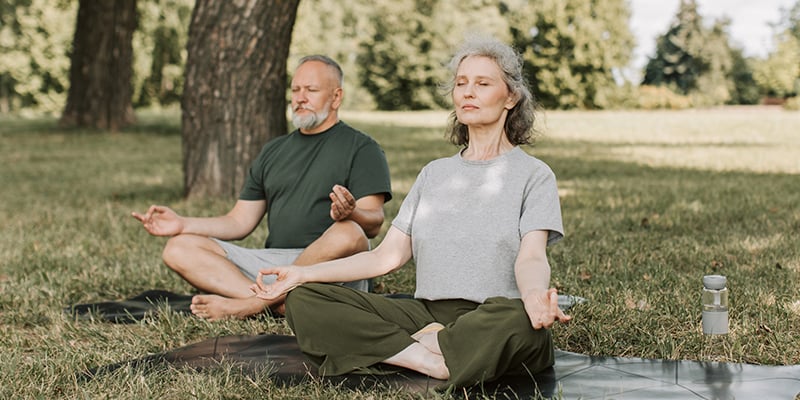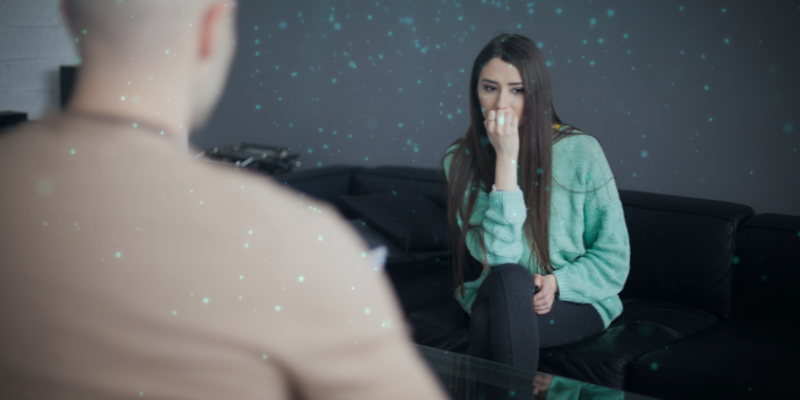
With various root causes, types, and degrees of intensity, anxiety is a complex mental health condition. And, when left untreated, anxiety can produce a plethora of negative effects—everything from trouble sleeping or concentrating to panic attacks and depression.
Anyone who has felt the onset of anxiety knows that it can quickly feel overwhelming and difficult to manage. But there’s good news, too: Anxiety can be reduced through a variety of treatments—both ongoing efforts, like professional therapy, and on-the-spot calming practices, such as breathing and journaling.
Anxiety can be reduced through a variety of treatments—both ongoing efforts, like professional therapy, and on-the-spot calming practices, such as breathing and journaling. Click To TweetHere are 7 essential strategies to help manage this common condition.
1. Psychotherapy
Anxiety may stem from a variety of sources, from the biological (such as head injuries, addiction, or genetics) to psychological (like past trauma) and social (for example, stress at work). To pinpoint the causes, as well as potential methods of addressing the issue, it’s helpful to employ psychotherapy. A variety of therapeutic approaches can produce positive effects on anxiety: EMDR (Eye Movement Desensitization and Reprocessing), Cognitive Behavioral Therapy (CBT), hypnotherapy, couples or individual therapy, and more. These modalities offer multiple benefits, including strategies to cope with anxiety, a reduction in symptoms, and improved well-being and social relationships.
2. Killing the ANTs
Automatic negative thoughts, or ANTs, can creep in and drive anxiety levels higher. ANTs can take many forms, including all-or-nothing thinking, blaming others, and focusing on imagined doomsday scenarios. These negative thoughts rob you of joy in the present moment, but that’s not all. Research shows that repetitive negative thinking over time can increase the risk of long-term conditions, such as Alzheimer’s disease and dementia. Eliminating these thoughts involves employing techniques inspired by Cognitive Behavioral Therapy: writing down the negative thought, asking if the thought is completely true, and imagining yourself without the thought. Over time and with consistent practice, killing those ANTs helps reshape thought processes and diminishes anxiety.
3. Diaphragmatic breathing
When anxiety or a panic attack strikes, there’s a simple way to soothe the system in as little as 2 minutes, using the skill of diaphragmatic breathing. In times of anxiety, breathing may naturally become erratic, fast, or shallow, but diaphragmatic breathing teaches us how to breathe deeper, doubling lung capacity and feeding more oxygen to the brain. To practice this technique, lie down on your back and place a book or other light object on the stomach (the belly, not the chest, should rise and fall with the breath). Take in a slow, deep breath for 4 seconds, hold for a second, and breathe out for 8 seconds. Practice this twice daily so it feels natural when it’s needed most—i.e., when anxiety surfaces in response to a sudden stressor.
4. Mindfulness
Breathing techniques can be combined with meditation practices for improved results in lowering anxiety. For example, mindfulness meditation, a form of Dialectical Behavior Therapy (DBT), has been shown in one study to lower symptoms of anxiety and even improve cardiovascular health by lowering pressure on the arteries. The American Psychological Association reports that mindfulness—which involves paying attention to the present moment without passing judgment—reduces stress and anxiety, improves physical health, and may even boost the immune system. Ultimately, mindfulness practitioners learn, over time, how to face stressful situations with fewer reactive negative thoughts and emotions.
5. Learning to say no
Find yourself overextended and exhausted because you just can’t say no? Taking on more than you can handle may seem like a selfless impulse, but in reality, it creates an anxiety-producing stream of overwhelm, leading to long-term resentments and chronic stress. This habit is often spurred on by anxiety and low self-worth, as those who practice it falsely believe their willingness to help will earn them approval. Furthermore, saying yes to too much can occur without thought; this habit is associated with low activity in the prefrontal cortex, which leads to less ability to think ahead or consider consequences. Hence, one way to battle the habit is to pause. Instead of automatically saying yes, say, “I’ll have to think about that,” and honestly evaluate whether you have time. If not, politely but firmly decline. Luckily, learning to say no—a skill often learned in Dialectical Behavior Therapy—feels easier and more natural with practice.
6. Knowing your values and purpose
A form of acceptance and commitment therapy, defining core values—and allowing those to drive your actions—helps create a happier, lower-anxiety life. Researchers have found that living in a purposeful way is associated with less depression, higher levels of satisfaction, better sleep, improved mental health, greater self-acceptance, and more. To determine core values, outline your most important 1 or 2 characteristics or traits in 4 categories (biological, psychological, social, and spiritual), and consider the values that draw you to your most influential heroes. Then, to find your purpose, examine what you love to do, how it can connect to and help others, and how you’d like to be remembered in years to come. A sense of values and purpose helps foster personal growth, gives back to others, and can even increase life longevity.
7. Journaling
Starting a practice of journaling was shown in one study to positively impact participants who otherwise experienced increased psychological distress. But one approach in particular, gratitude journaling, offers a bevy of benefits for those with anxiety by shifting the focus from the negative to the positive. Specifically, gratitude practitioners activate the parasympathetic nervous system, reduce inflammatory markers, experience less depression and stress, and increase overall happiness. Particular subsets of the population have also been shown to benefit—think boosted life satisfaction in the elderly and less stress among healthcare practitioners. To practice, simply write down 3 things to be grateful for on a regular basis. Over time, gratitude will become ingrained, so looking for the positives in life will start to feel like second nature.
Anxiety and other mental health issues can’t wait. At Amen Clinics, we’re here for you. We offer in-clinic brain scanning and appointments, as well as mental telehealth, remote clinical evaluations, and video therapy for adults, children, and couples. Find out more by speaking to a specialist today at 888-288-9834 or visit our contact page here.





Thanku for the info I’m on disability for mental health bipolar and I TRY every day for peace of mind
Comment by Jimmy c — March 14, 2022 @ 3:55 AM
Hello, do you take Medicare insurance yet for therapy?
Comment by Sharon Peek — March 14, 2022 @ 3:57 AM
My mental health brain injury addiction bipolar, please dr amen tell me there is finally a payment plan, millions are missing out and frankly I don’t know how much longer I can do this. I am safe. Complex traima
Comment by Deb — March 14, 2022 @ 5:14 AM
Excellent article! As a Leadership coach it is very common to see anxiety issues that limit people.
The issues can be addressed and resolved.
Comment by Thedas Dukes — March 14, 2022 @ 5:46 AM
Excellent article!
Comment by Thedas Dukes — March 14, 2022 @ 6:21 AM
Hello Deb, thank you for reaching out. Amen Clinics offer financing options through Care Credit. We’d be happy to discuss pricing, insurance, reimbursement and financing options. Please contact our Care Coordinators: https://amenclinics.com/schedule-visit/
Comment by Amen Clinics — March 14, 2022 @ 9:29 AM
Hello Sharon, thank you for reaching out. Please contact our Care Coordinators to discuss pricing, insurance, reimbursement and financing options: https://amenclinics.com/schedule-visit/.
Comment by Amen Clinics — March 14, 2022 @ 9:30 AM
I have been on brand name Klonopin for anxiety (from severe childhood abuse/cult abuse). My eventual goal is to get off of it. I am 55 y/o.
I recently had to switch from brand name Klonopin to Teva generic Clonazapam. The drug company stopped making the brand name, so it was a forced and rapid switch. I have read that the generics contain the same amount of Klonopin as the brand name. For me, it acts differently on/in my body. I sense that the generic has methyl groups in it. My body has too many methyl groups; I cannot tolerate anything that has added methyl groups. Do you have any info on whether the fillers in Teva Clonazapam contain (added) methyl groups? My psychiatrist is unable to help me.
Thank you!
Comment by Amy — March 14, 2022 @ 11:01 AM
Why is it that menopausal women have more anxiety issues and often missed by OGBYN or Gen Docs
Comment by jb — March 14, 2022 @ 3:50 PM
Thank you for this excellent article. I don’t have much anxiety, and have for many years practised diaphragmatic breathing, meditation and mindfulness. I know their value. Still, I can improve my resilience and I will implement some of your other suggestions where I fall down a little. I feel for Deb, Amy and the many others who suffer from anxiety and other mental health conditions and radiate care and compassion to all. I am so very grateful that I recently stumbled across Dr Daniel Amen on U-tube. Actually, I don’t think it was a stumble. I think my innate intelligence led me there as part of my healing journey.
Comment by Sherida — March 16, 2022 @ 12:26 AM
I'm glad you explained how there are different therapy treatments for anxiety. Recently, I met with my sister and realized how she looks different, and her anxiety attacks seem to have started again, so I think it's time she looks for professional treatment. I appreciate your advice on anxiety and how you have many options to help you. https://jktherapy.com/anxiety-telehealth.html
Comment by Eli Richardson — July 14, 2022 @ 8:40 AM
Excellent article. Most psychiatrists prefer chemical pharmacy bombs which trigger suicidal tendencies. Stay with Dr. Amen's advice.
Comment by Tom Ka — September 25, 2023 @ 11:47 AM
excellent topic
Comment by Doug Morris — September 25, 2023 @ 3:09 PM